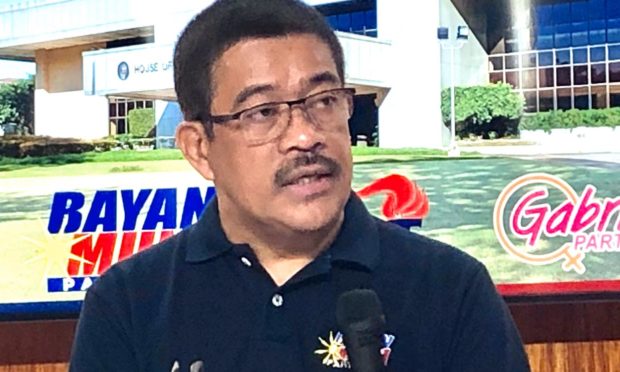Probe troll farms, lawmakers urge

Bayan Muna Rep. Carlos Isagani Zarate. INQUIRER.net file photo / Noy Morcoso
MANILA, Philippines — Leftist lawmakers pushed for a House investigation of Sen. Panfilo Lacson’s claim that an official of the Duterte administration has been using taxpayers’ money to organize at least two troll farms in every province for the 2022 presidential elections.
A troll is a person, whether paid or otherwise, who posts misleading statements or outright lies in the internet to manipulate public perception of issues or persons.
Under House Resolution No. 1900, Bayan Muna Reps. Carlos Zarate, Ferdinand Gaite, and Eufemia Cullamat said that a troll farm or a troll factory is a group of internet trolls that seeks to “interfere in political opinions and decision-making.”
“If public time and resources are involved, these are not just wasting taxpayers’ money but even criminal acts just to malign and harass anyone who criticizes the Duterte administration,” Zarate said in a statement.
He warned that troll farms are “very dangerous” for the country’s democracy, especially in the coming elections as they could “create a false clamor for a fake presidential candidate.”
Article continues after this advertisement“We would have a troll president and we definitely do not want that,” said Zarate, a deputy minority leader of the House of Representatives.
Article continues after this advertisementZarate earlier urged Lacson to name the undersecretary operating these troll farms.
In 2017, a University of Oxford study found that the Duterte camp spent $200,000 or about P10 million during the 2016 elections to fund a social media campaign for then Davao City mayor Rodrigo Duterte.
In the same year, US-based rights group Freedom House said the Duterte administration was operating fake social media accounts to attack its critics, employing what it called “a keyboard army.”
In April 2018, the South China Morning Post reported that Filipinos associated with the Duterte campaign conferred in 2015 with the parent company of Cambridge Analytica, which was found to have harvested personal data from Facebook for political purposes, including the 2016 Philippine presidential election and the US presidential election in the same year.
Strategic Communications Laboratories, which owns Cambridge Analytica, even boasted on its website that it helped get Duterte elected in 2016 by rebranding him as a tough crime fighter.
President Duterte, who won in the 2016 presidential elections with a minority of 16 million votes, admitted in 2017 that he paid people to defend him on social media during the campaign period only.
Experienced political campaign managers claimed that the 16 million votes Duterte garnered in 2016 has likely been diminished substantially because of the anti-poor policies implemented by his administration.
Among the policies are the rice tariffication law that affected rice farmers’ incomes, pork tariff cuts that favored importers to the detriment of thousands of hog raisers, a new law that cut off millions of coconut farmers from decisions on the controversial coco levy fund, and political concessions to China that have resulted in the loss of the traditional fishing grounds of Filipino fishermen.
On June 8, Lacson claimed that an unidentified government undersecretary has allegedly started organizing the troll farms to discredit critics of the administration and possible opponents in the 2022 elections.
Lacson said he only learned about this when a former staff member declined the offer and reported it to him.
He then underscored the need to elevate the political discourse and get rid of money or entertainment politics.